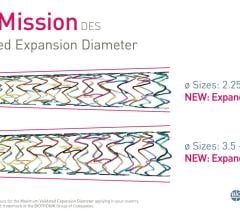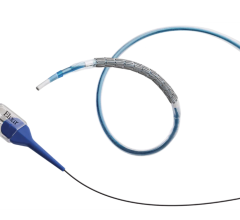
May 15, 2012 –– As EuroPCR 2012 gets underway, Medtronic Inc.announced that the Resolute Integrity Coronary Stent System has received European regulatory approval for several new indications, making it the drug-eluting stent (DES) with the broadest range of approved indications in Europe.
The Resolute Integrity DES is now explicitly indicated in countries outside the United States that accept the CE mark for the following patient and lesion types: acute coronary syndromes, acute myocardial infarction, unstable angina; diabetes mellitus; bifurcations; multi-vessel disease; total occlusions and chronic total occlusions; and in-stent restenosis. All but the indications for diabetes and multi-vessel disease are new.
Two of the studies that contributed to the European regulatory authority’s approval of these indications, RESOLUTE All Comers and RESOLUTE International, are the subject of several new data presentations at EuroPCR, which attracts thousands of physicians from around the world who specialize in cardiovascular interventions.
RESOLUTE All Comers: Three-Year Results
Three-year results from RESOLUTE All Comers, a randomized controlled trial comparing the Resolute DES to the Xience V DES from Abbott Laboratories, showed that the Medtronic device continues to match its chief competitor on important measures of safety and efficacy in long-term follow-up.
RESOLUTE All Comers enrolled nearly 2,300 patients, with very few exclusion criteria, at 17 centers in Europe and Israel. As a result, 66 percent of the “real-world” patients in the study were considered complex, which is representative of standard clinical practice.
RESOLUTE All Comers used the primary endpoint preferred by the U.S. Food and Drug Administration (FDA) for studies of drug-eluting stents: target lesion failure (TLF), a composite of cardiac death, target vessel myocardial infarction and clinically-driven target lesion revascularization, at one year of follow-up.
Presented by Prof. Stephan Windecker of Bern University Hospital in Switzerland, a co-principal investigator of the study, the rates of TLF at three years in RESOLUTE All Comers remain equivalent for the two devices: 13.1% for Resolute; 12.4% for Xience V (p=0.614). Additionally, the rates of definite/probable stent thrombosis at three years were low, with no statistically significant difference. Rates of definite/probable very late stent thrombosis (VLST) were the same for the twodevices (0.5% vs. 0.5%, p=1.00).
“RESOLUTE All Comers has amassed an invaluable data set to guide stent selection for patients with coronary artery disease, regardless of its complexity,” said Prof. Windecker. “The rigorous design and conduct of the study, which enrolled a majority of complex patients and has lost less than two percent of patients to follow-up, makes the results highly relevant to the contemporary clinical practice of interventional cardiology worldwide.”
Prof. Windecker’s co-PIs for RESOLUTE All Comers are Prof. Patrick Serruys, M.D., Ph.D., of the Thoraxcenter at Erasmus University in Rotterdam, the Netherlands, and Prof. Sigmund Silber, M.D., of the Heart Catheterization Centre in Munich, Germany.
Pooled Analyses: Bifurcation Lesions and In-Stent Restenosis at Two Years
Two-year results from RESOLUTE All Comers and RESOLUTE International in patients with bifurcation lesions and in-stent restenosis will also be presented at EuroPCR. These two subsets are common in standard clinical practice, together accounting for approximately 20–25 percent of patients who receive stents.
The pooled data set on bifurcation lesions, which remain a therapeutic challenge for the interventional community, will be presented on Thursday by Dr. Ran Kornowski from Rabin Medical Center and Tel Aviv University in Israel.
As the only DES on the market with an indication for treating bifurcated lesions, the Resolute DES performed extremely well in this patient subset. Of the 702 patients with bifurcated lesions, the use of the Resolute DES and its excellent side branch access resulted in a low TLF rate of 12.6 percent at two years (and 10.4 percent at one year).
The pooled data set on in-stent restenosis (ISR) will be presented by Dr. Gert Richardt from the Segeberger Clinic’s Heart Center in Germany. Patients presenting with ISR have been associated with worse outcomes and a higher rate of repeat procedures than patients who are treated for de novo lesions. At two years, the 281 ISR patients treated with a Resolute DES had a TLF rate of 17.5 percent, which is considered low for patients with this challenging lesion type. The TLF rate at one year was 10.8 percent.
In collaboration with leading clinicians, researchers and scientists, Medtronic offers the broadest range of innovative medical technology for the interventional and surgical treatment of cardiovascular disease and cardiac arrhythmias. The company strives to offer products and services that deliver clinical and economic value to healthcare consumers and providers worldwide.
For more information: www.medtronic.com


 July 02, 2024
July 02, 2024 









